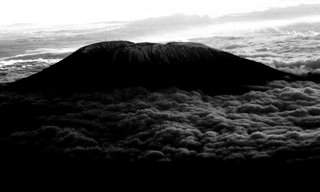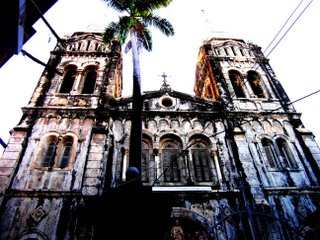Bonjou zanmi mwen!
(I think that means “Hello my friends” in Creole).
Well I am here safe and sound in Port-au-Prince, Haiti despite an exciting first day.
 As I had been warned, the arrival at Toussaint-Louverture Airport is pretty chaotic and in the general mêlée that greets the new arrivals after the baggage claim, I wasn’t able to find the driver sent to pick me up. With nighfall fast approaching (the sky is dark by five thirty these days) I had to scramble to find a taxi to take me to my hotel, something I had been warned repeatedly against doing. Fortunately Edouard the cabby proved to be a trustworthy sort, although he probably should have introduced me to (or just mentioned) his very quiet friend sitting in the backseat right behind me before I had a chance to discover his presence while driving near one of the city’s most notorious crime zones.
As I had been warned, the arrival at Toussaint-Louverture Airport is pretty chaotic and in the general mêlée that greets the new arrivals after the baggage claim, I wasn’t able to find the driver sent to pick me up. With nighfall fast approaching (the sky is dark by five thirty these days) I had to scramble to find a taxi to take me to my hotel, something I had been warned repeatedly against doing. Fortunately Edouard the cabby proved to be a trustworthy sort, although he probably should have introduced me to (or just mentioned) his very quiet friend sitting in the backseat right behind me before I had a chance to discover his presence while driving near one of the city’s most notorious crime zones.
Port-au-Prince on a rainy night is definitely not a very welcoming sight, what with the little man-made light coming from roadside burning piles of trash and headlights careening towards you on narrow decrepit roads illuminating a landscape of concrete blocks and steep dark barren hills. Even in the relatively posh neighborhood of Pétionville electric lights are barely able to make dents into the night, though they and your headlights do reflect on a great number of people walking and congregating on the sidewalks.

The Hotel Kinam (www.hotelkinam.com) is well hidden in the middle of the suburb, near the bustling Place St. Pierre. It is a converted old “gingerbread style” house/complex and it is a welcome haven at the end of this day. Improbably, I fall asleep watching Sealab on satellite TV.
Morning brings a much cheerier outlook, with the early sunshine 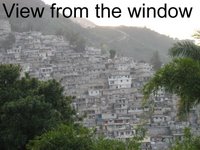 sweeping through the hillsides. I can now make out the view outside my window and its vivid illustration of Haitian urban economics (shoutout to Will) with the hillcrest mansions dominating increasingly more modest dwellings below.
sweeping through the hillsides. I can now make out the view outside my window and its vivid illustration of Haitian urban economics (shoutout to Will) with the hillcrest mansions dominating increasingly more modest dwellings below.
The Catholic Relief Services (CRS) driver arrives a bit below nine to take me to the office. Taking the back roads to the main artery of Delmas, I discover a world much more habitable than the one I saw the night before. Dark facades have turned to colorful store fronts. Judging by their wares I would guess that Haitian life revolves around hair care, cell phones and personal finances – a nation of high school girls. Most transactions, however, appear to take place on the sidewalk, with people peddling everything from perishables to paintings.
The CRS offices are located just outside of the chaotic Avenue Delmas, the main road linking Port-au-Prince to Pétionville. The small complex is completely encircled by high walls and manned gates. As at the Kinam, the first person I see upon entrance is wielding a shotgun, his clothing adorned by clusters of shells. Once inside the building I am shown to my office, a nice air-conditioned space on the second floor.
Due to the occurrence of two major holidays this week (All Saints and the Day of the Dead), most of the CRS staff is away. While I do get to shake a couple of hands, my morning is mostly occupied with getting set up in my new space. Soon enough, however, I get word that I am scheduled to meet my predecessor before lunch. Now the only thing I know about this man, a local, was that he learned of his dismissal only a short time ago and that said dismissal was less than voluntary. Of all the things I had a mind to dread on this first trip, meeting Dr. Gustave Jean-Michel was the most likely to actually live up to my fears.
As it turns out Gus (as he insisted I call him) is about as disgruntled as a Wheel of Fortune winner. He is happy to be spending more time with his family (they are headed to the beach the next day) and to resume his work in more general public health programs. That makes our main task of the morning (signing over the company bank account to my name) much less apprehensible, my mind completely at ease as we park on the sidewalk of the Unibank’s Turgeau branch.
The interior of the bank is rather unremarkable: industrial tiles on the floor, aging promotional posters on the walls three harried tellers behind a chest-high counter, the now-ubiquitous armed guard patrolling the space. The only unusual thing about the scene is the incredible number of people that had decided to take care of their banking needs at that very moment. Every square foot of the space was occupied by pairs of feet, each, it seemed, pointed at a different direction. Despite the outward chaos, things are surprisingly quiet inside and the apparent disorder of the tableau had rearranged itself into a system of waiting lines, so that Gus and I, having arrived at eleven-thirty are able to leave the place by two, an apparently quite respectable time for a financial transaction in Port-au-Prince.
Back in the office soon thereafter, I am driven home by four-thirty as most of the staff elects to leave before sundown. A bland hotel dinner is followed by some reading and bed, a quiet end to an eventful first twenty four hours in Haiti.

 In the evenings, expeditions were made to
In the evenings, expeditions were made to 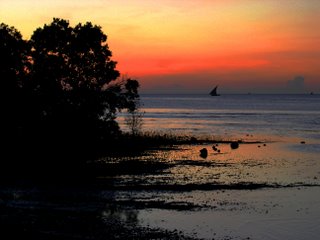 When staying at the hotel, we could always walk on the beach and take a look at the activities of the fishermen and look at the ridiculously beautiful sunsets. Also, a good bit of Tusker beer was consumed.
When staying at the hotel, we could always walk on the beach and take a look at the activities of the fishermen and look at the ridiculously beautiful sunsets. Also, a good bit of Tusker beer was consumed.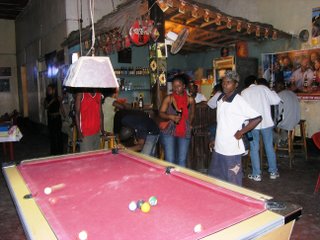 us hit the local bars, starting with what I took to be a student hang-out, an old, worn-out joint devoid of fans or mosquito screens, but home to a busted pool table where I got creamed by the local champion who celebrated each victory by performing the splits. We went from there to an open-air disco a bit away from the center of town. There again, pool was the most popular activity as dancing, we were told, would not start until morning neared.
us hit the local bars, starting with what I took to be a student hang-out, an old, worn-out joint devoid of fans or mosquito screens, but home to a busted pool table where I got creamed by the local champion who celebrated each victory by performing the splits. We went from there to an open-air disco a bit away from the center of town. There again, pool was the most popular activity as dancing, we were told, would not start until morning neared. 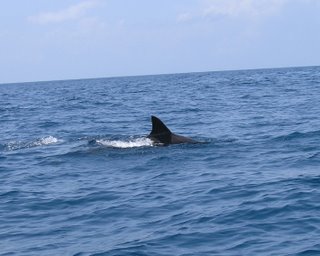 The following day, our
The following day, our 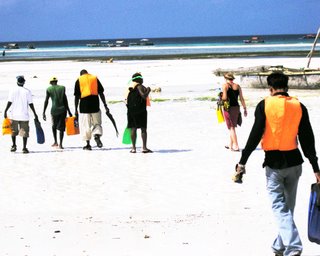 only full free one of the stay, seven of us headed to the northernmost point of the
only full free one of the stay, seven of us headed to the northernmost point of the  for a few days of work at HQ and the chance to go home for Thanksgiving. Next post: finding a place to live in
for a few days of work at HQ and the chance to go home for Thanksgiving. Next post: finding a place to live in 

